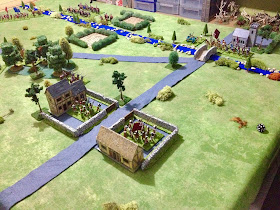To open the campaign of 1643 Royalist forces recruited an army and marched on the West Midlands. Parliament diverted their army to meet this threat and an opening battle occurred at the town of Pershore.
The armies sighted each other in the afternoon and deployed. From a gaming view point the Royalists, having the smaller force, were allowed to deploy on their tabletop side of choice. Placing half their units before Parliament deployed all their units on the opposing side. The remaining Royalist forces are deployed and they will get to go first in the turns and adjust their positions.
 |
| Opening positions |
Neither army seemed to be in a hurry, so it was late afternoon when Parliament attempted manoeuvres. The river was deemed fordable along its whole length by all units. Cavalry could cross unimpeded with a 6 inch move, while foot could cross but would take 1 hit. There was one bridge near the Abbey where infantry could cross without cost.
 |
| Tabletop setup based upon the terrain cards (see previous post) |
Prior to the game both sides had drawn a change card. The Royalists were having issues with their leadership (a bit of rivalry perhaps?) And would reduce their turn activations by one. While it was the opposite case with Parliament's army who had an experienced commander. This increased their activations by one each turn.
















The Royalists came out the worse on day one. With a smaller force, they cannot afford a battle of attrition. My money is on Parliament for the victory.
ReplyDeleteEven with their good defensive position it will be a hard task to gain any victory.
DeleteVery good, when I first read that you had dropped the game to 5 turns, I thought it would not give enough time to cause significant casualties ... but what a surprise.
ReplyDeleteWhile most unit vs unit engagements are over in 3-5 turns, it was still a bit of a surprise how quickly the eliminated units mounted up in those few turns.
DeleteAnother great game, the ideas for limited turns due to time of day and conditions is very clever.
ReplyDeleteDuring the campaign I will be trying to introduce both time and weather into the rules. Both based on ideas from various wargaming books and rules.
DeleteThe Royalist cavalry managed to disappoint yet again, although they can protest that they were outnumbered. The forces of the King will need a lot of luck to pull a win out of this one, I think!
ReplyDeleteWhere is Prince Rupert when you need him! They still have a strong central defensive position and Parliamentary forces are spread out which creates command activation difficulties.
Delete